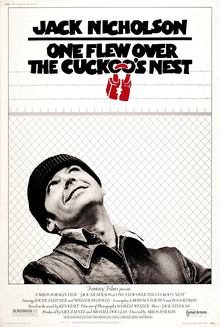Of all human phenomena, genius may be the most puzzling. What combination of heredity and environment produced a Shakespeare, a Leonardo, a Newton, a Mozart? For the Antonio Salieri of Peter Shaffer's play and the screenplay he based on it, the only answer has to be God. And his jealousy of Mozart leads him to a rejection of God and an attempt to destroy God's creation, whom he sees as a giggling, smutty-minded clown unworthy of the musical talent God has lavished on him. Amadeus is not a biopic; Shaffer called it a "fantasia" based on the lives and careers of Mozart and Salieri, and he plays fast and loose with the details of both. That has disturbed many who know the facts, but the sumptuous entertainment of the movie almost justifies the distortions and prevarications of the story it tells. That it's filled with Mozart's music is certainly most in its favor, and the performances of F. Murray Abraham as Salieri and Tom Hulce as Mozart add to it. Sometimes a beautiful lie is more satisfying than the truth.
A blog formerly known as Bookishness / By Charles Matthews
"Dazzled by so many and such marvelous inventions, the people of Macondo ... became indignant over the living images that the prosperous merchant Bruno Crespi projected in the theater with the lion-head ticket windows, for a character who had died and was buried in one film and for whose misfortune tears had been shed would reappear alive and transformed into an Arab in the next one. The audience, who had paid two cents apiece to share the difficulties of the actors, would not tolerate that outlandish fraud and they broke up the seats. The mayor, at the urging of Bruno Crespi, explained in a proclamation that the cinema was a machine of illusions that did not merit the emotional outbursts of the audience. With that discouraging explanation many ... decided not to return to the movies, considering that they already had too many troubles of their own to weep over the acted-out misfortunes of imaginary beings."--Gabriel García Márquez, One Hundred Years of Solitude
Search This Blog
Saturday, March 15, 2025
Amadeus (Milos Forman, 1984)
Monday, September 2, 2024
The People vs. Larry Flynt (Milos Forman, 1996)
 |
| Woody Harrelson in The People vs. Larry Flynt |
Cast: Woody Harrelson, Courtney Love, Edward Norton, Brett Harrelson, Donna Hanover, James Cromwell, Crispin Glover, Vincent Schiavelli, Miles Chapin, James Carville, Richard Paul, Larry Flynt. Screenplay: Scott Alexander, Larry Karaszewski. Cinematography: Philippe Rousselot. Production design: Patrizia von Brandenstein. Film editing: Christopher Tellefsen. Music: Thomas Newman.
The People vs. Larry Flynt succeeds as a message movie, demonstrating that even the most obnoxious among us -- and Larry Flynt was certainly that -- deserves the protection of the First Amendment. Of course, the movie didn't have to do that for us; the Rehnquist Supreme Court did it, unanimously. (I have to wonder if today's court, with so many justices appointed by a president who railed against the news media as "fake" and referred to the press as enemies of the people, would do likewise.) Where the film falls down is in its efforts to be a biopic as well as a message movie. We get a glimpse of Flynt's backwoods Kentucky boyhood as a bootlegger who tries to keep his father from drinking up the profits, and we see how Flynt moved from strip club owner to magazine publisher, but none of this sheds enough light on how the flamboyantly defiant personality came together. Too much time is spent on Flynt's short-lived conversion to religion under the guidance of Jimmy Carter's sister, Ruth Stapleton (Donna Hanover), without tying it either to his past or to his emergence as a champion of free speech. But the portrayal of Flynt's relationship with Althea Leasure (entertainingly played by Courtney Love) does give us an insight into his mixture of rebellion and convention, as the two decidedly promiscuous people decide to get married. Nothing but love, it seems, can tame the beast. Certainly not the law. Woody Harrelson gets a chance to go over the top in the courtroom scenes, and he takes it wonderfully. Edward Norton is good, too, as Alan Isaacman, the Harvard-trained lawyer who has to put up with this yahoo. The People vs. Larry Flynt might have held together better if Flynt's story had been told from Isaacman's point of view instead of the somewhat glossy, somewhat reticent, somewhat too admiring account the screenplay gives us.
Saturday, February 8, 2020
The Firemen's Ball (Milos Forman, 1967)
Cast: Jan Vostrcil, Josef Sebánek, Josef Valnoha, Frantisek Debelka, Josef Kolb, Jan Stöckl. Screenplay: Milos Forman, Jaroslav Papousek, Ivan Passer, Václav Sasek. Cinematography: Miroslav Ondrícek. Production design: Karel Cerný. Film editing: Miroslav Hájek. Music: Karel Mares.
Milos Forman's raucous comedy about the screwups of a small town fire department as it attempts to celebrate its retired fire chief and raise money with a raffle got the director into deep trouble in Czechoslovakia when the regime realized that the film was actually a satire on communist bureaucracy. And the truth is, The Firemen's Ball teeters between slapstick comedy and mordant satire so much that it winds up a little too dark for laughter, a little too silly for pointed criticism. Which is not to say that it isn't sometimes very funny or that its criticism didn't have an effect: Forman went into exile and wound up a major Hollywood director. The mostly non-professional actors in its cast throw themselves into their roles and the pacing of the film is appropriately hectic. Somehow, despite the frowns of officialdom, The Firemen's Ball wound up as the Czech entry for the best foreign language film at the Oscars, which led to another irony: The winner in that category was the Soviet Union's entry, Sergey Bondarchuk's War and Peace.





